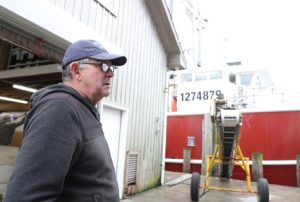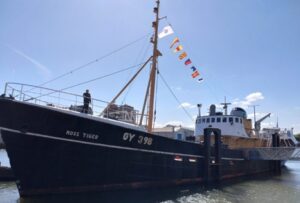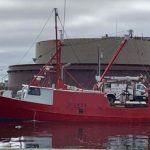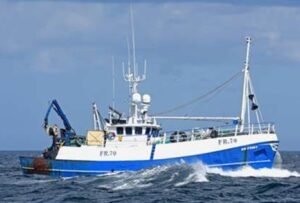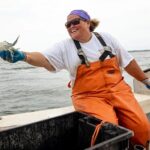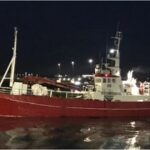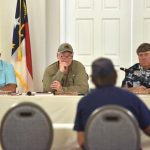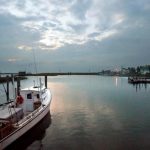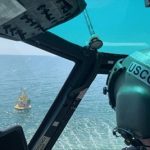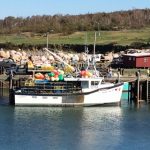Tag Archives: fixed-gear
Interview: Massachusetts lobstermen want to invent a better lobster trap
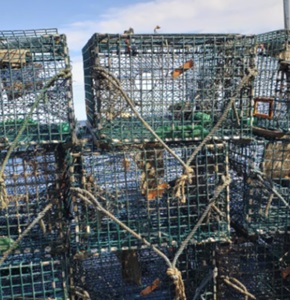 For years, right whale advocates and engineers have been trying to develop new lobster fishing gear designed to prevent whales from entanglements. But most local lobstermen say they’re against this so-called “on demand” fishing gear that’s been created. Now, as CAI’s Eve Zuckoff reports, lobstermen have decided to come up with their own technology. Eve, you were the first to report this, thanks for being here this morning. Eve Zuckoff: Thanks for having me. Patrick Flanary: So the Massachusetts lobstermen’s association has just been awarded a $1.2 million grant to develop new fishing gear. What’s their proposal? more, >>click to read<< 09:47
For years, right whale advocates and engineers have been trying to develop new lobster fishing gear designed to prevent whales from entanglements. But most local lobstermen say they’re against this so-called “on demand” fishing gear that’s been created. Now, as CAI’s Eve Zuckoff reports, lobstermen have decided to come up with their own technology. Eve, you were the first to report this, thanks for being here this morning. Eve Zuckoff: Thanks for having me. Patrick Flanary: So the Massachusetts lobstermen’s association has just been awarded a $1.2 million grant to develop new fishing gear. What’s their proposal? more, >>click to read<< 09:47
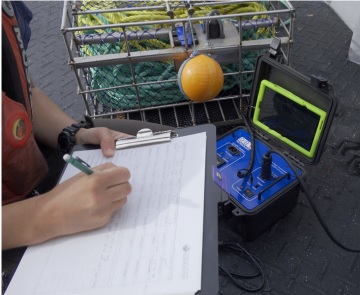
Gear-lending program has harvesters working through closures and trying ropeless fishing gear without commitment
Snow crab fishers in one area of Nova Scotia had a new visitor this season and found themselves closed out of their fishing waters. “We got a 37 percent cut in our quota and [Northern right] whales presented themselves in our zone for the first time ever so [it was] quite stressful,” said Marc Lefort, a snow crab harvester in western Cape Breton Island and a member of Area 19 Snow Crab Fishermen’s Association in Cheticamp, N.S. He’s been fishing for 19 years in the area. “It was a challenging season.” The Northern right whale is critically endangered and conservation efforts have targeted fisheries using fixed gear, or traps connected to buoys by rope. Because whales can be entangled in the fishing gear, fisheries for lobster and snow crab have been forced to think of new measures – and new fishing gear – to protect the marine mammals. >>click to read<< 12:24
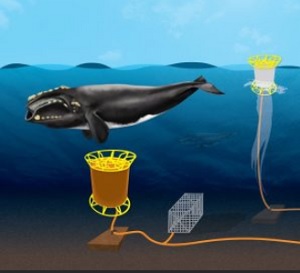
South Atlantic: NMFS accepting input on “ropeless” black sea bass pots
The National Marine Fisheries Service is accepting comments on an application for an exempted fishing permit from Sustainable Seas Technology Inc. The applicant proposes deploying modified black sea bass pots with acoustic subsea buoy retrieval systems in federal waters off North Carolina, South Carolina, Georgia and northeastern Florida. Adaptation of “ropeless” systems for this style of pot fishing could reduce risk to these whales and other marine animals that suffer entanglements, according to the applicant. >click to read< 09:56 fixed gear
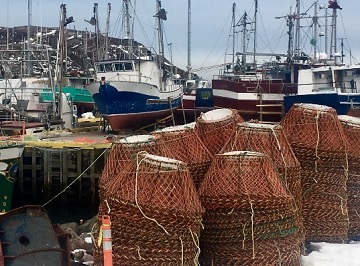
FFAW Calling on DFO to Cease Plans with Weak-Rope Policy
The FFAW is once again calling on DFO to immediately cease its plans to implement a weak-rope policy for harvesters in Newfoundland and Labrador. The policy is being introduced across Atlantic Canada to help save rare and endangered North Atlantic right whales from entanglement. The whales are surface feeders and are prone to ship strikes and drowning after becoming entangled in fishing gear. The weak-rope policy is being brought in to allow the creatures to break free. >click to read< 10:55
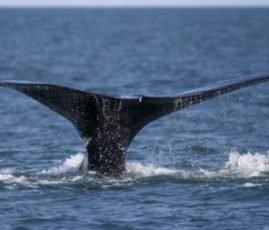
Canada implements the $20M Whalesafe Gear Adoption Fund
The Honourable Bernadette Jordan, announced the new $20 million Whalesafe Gear Adoption Fund, to help harvesters in Atlantic Canada and Quebec adopt whalesafe gear into their commercial fishing operations. Over the next two years, this funding will be available to support Indigenous and non-indigenous harvesters, not-for-profit organizations, academia and other partners to purchase, test and refine existing whalesafe gear, such as low breaking strength rope and ropeless gear technology, with the goal of making them operational by 2023. The Whalesafe Gear Adoption Fund will also provide support to Canadian manufacturers to encourage domestic supply of commercially-ready whalesafe gear by 2023. >click to read< 14:53
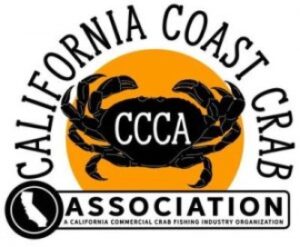
Misguided AB 534 ‘Pop-Up Crab Gear’ Will Hurt Whales, Fishing Families, Coastal Communities
Data Show Whale Populations Soaring, Virtually No Interactions with Crab Gear! Recently, Assembly Member Bonta of the California Legislature introduced a bill, AB 534 that if passed, would require faulty and failure prone ropeless fishing gear, as determined by the California Department of Fish and Wildlife (CDFW), to be used when taking any species of fish for commercial or recreational purposes when using a trap. AB 534 promotes an unproven and unviable fishing method that presents significant operational and safety risks to West Coast fisheries and that will result in more harm to marine life. The bill is an end-run around existing state and federal regulatory >click to read< 13:32
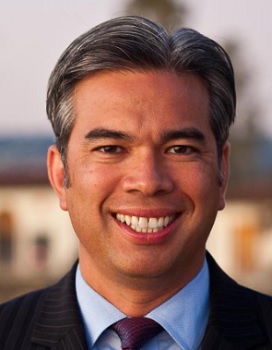 Bill 534 could eliminate whale entanglements, hurt (destroy) the crab fishery – 03/4/2021, Authored by Rob Bonta-D California, in collaboration with Social Compassion in Legislation and the Center for Biological Diversity, Assembly Bill 534 argues that crabbers use antiquated trapping gear >click to read<
Bill 534 could eliminate whale entanglements, hurt (destroy) the crab fishery – 03/4/2021, Authored by Rob Bonta-D California, in collaboration with Social Compassion in Legislation and the Center for Biological Diversity, Assembly Bill 534 argues that crabbers use antiquated trapping gear >click to read<
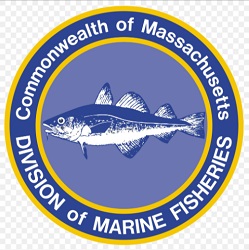
Massachusetts Launches ‘Ropeless’ Fishing Feasibility Study
The Massachusetts Division of Marine Fisheries (DMF) has launched a comprehensive scoping project to assess ‘ropeless’ fishing gear in the New England lobster fishery. A first of its kind on an accelerated timeline, the project will interview dozens of fishermen, technologists, policy experts, and scientists to fully evaluate the challenges and opportunities of the new gear type. The twelve-month project will evaluate fishing, legal, regulatory, technological challenges and opportunities of alternative lobster gear, which could reduce whale entanglements. >click to read< 12:47
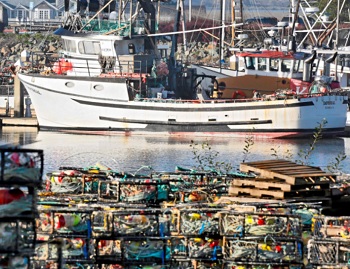
Crab season continues as whale entanglement risk remains low
From a California Department of Fish and Wildlife release: The California Department of Fish and Wildlife (CDFW) is providing the following important update on the status of the commercial California Dungeness crab fishery which includes the Northern Management Area (Fish and Game Districts 6, 7, 8 and 9) and Central Management Area (Fish and Game Districts 10 and south). more, >click to read< 09:42
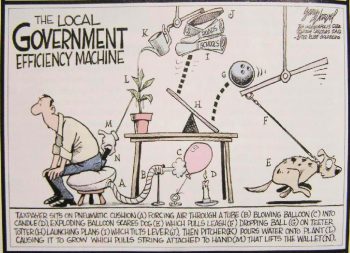
Rope free traps? Company studies ways for fishing nets and whales to coexist.
“It’s promising and many people are asking why we don’t use it right away — but it’s still in the scientific testing phase, with tests being done in the water and it has not yet been adapted for commercial fishing,” Cormier explained. In some trials, the buoy took up to 30 minutes to surface; in other cases it never surfaced. “There is still work to be done as far as the reliability of the equipment,” he said. “We don’t want to create another problem, that of ghost fishing.” >click to read< 09:49
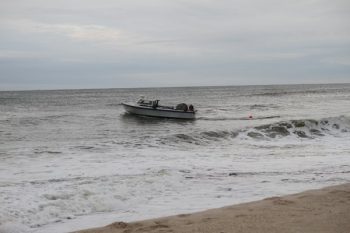
Entangled Whale Prompts Criticism Of Gill Nets
The small whale that was freed from a commercial fishing net after becoming entangled off Sagaponack last week has prompted community concern about the safety of the type of fishing nets it had encountered. “Whales and dolphins get caught in these nets all the time,” said George Mittendorf, a Wainscott resident and amateur sporting fisherman. (expert witness?) >click to read< 09:28

Notice of fisheries closures – Fishermen told to remove gear from gulf areas to protect right whales
Fishermen have until Wednesday to get their gear out of the water in five newly closed fishing zones of the Gulf of St. Lawrence. The Department of Fisheries and Oceans has gotten reports of North Atlantic Right Whales in the area prompting the closure of more fishing zones. DFO said crews must remove their gear by 5 p.m. AT on Wednesday, June 6. The next 24 hours will bring high winds, so DFO is allowing a longer notice than usual. “All gear must be removed from the closed area before the time of closure,”>click to read<DFO notice>click here<08:04

Fixed Gear Closures – NOAA closes areas to protect whales
As NOAA Fisheries continues to address the rising peril to whales in coastal waters stretching from New England to Florida, it is reminding local fishermen of current or impending gear closures off Massachusetts. The closures, primarily around Cape Cod and in Cape Cod Bay, are part of NOAA Fisheries’ Atlantic large whale take reduction plan developed to provide increased protection to several species of whales — particularly the endangered North Atlantic right whales whose population continues to plummet. Some of the gear closures impact trap and pot fishermen, while other impact gillnetters. >click to read<19:15
Pacific Council approves three West Coast commercial fishing fleets for electronic monitoring
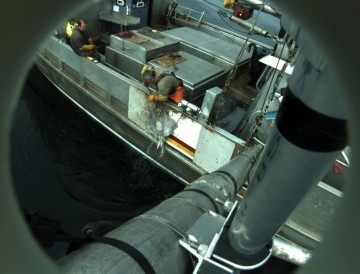 As of 2017, the , and mothership catcher vessel fleets will no longer be required to carry human observers on fishing trips, helping to simplify logistics, reduce costs and increase profits for fishermen. Heather Mann, executive director of the Midwater Trawler’s Cooperative, an Oregon-based organization representing 18 whiting vessels, said: “What this decision does is transfer responsibility for catch accounting from the federal government to vessel operators, where it should be.” Read the rest here 17:24
As of 2017, the , and mothership catcher vessel fleets will no longer be required to carry human observers on fishing trips, helping to simplify logistics, reduce costs and increase profits for fishermen. Heather Mann, executive director of the Midwater Trawler’s Cooperative, an Oregon-based organization representing 18 whiting vessels, said: “What this decision does is transfer responsibility for catch accounting from the federal government to vessel operators, where it should be.” Read the rest here 17:24

































